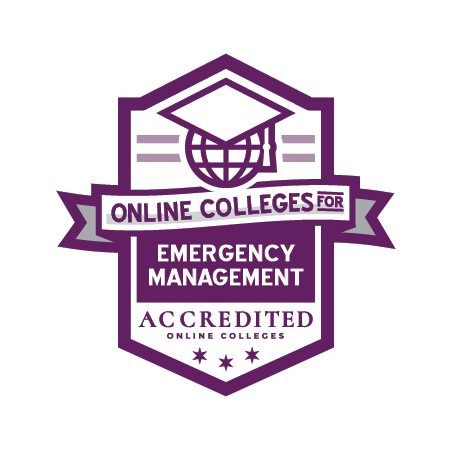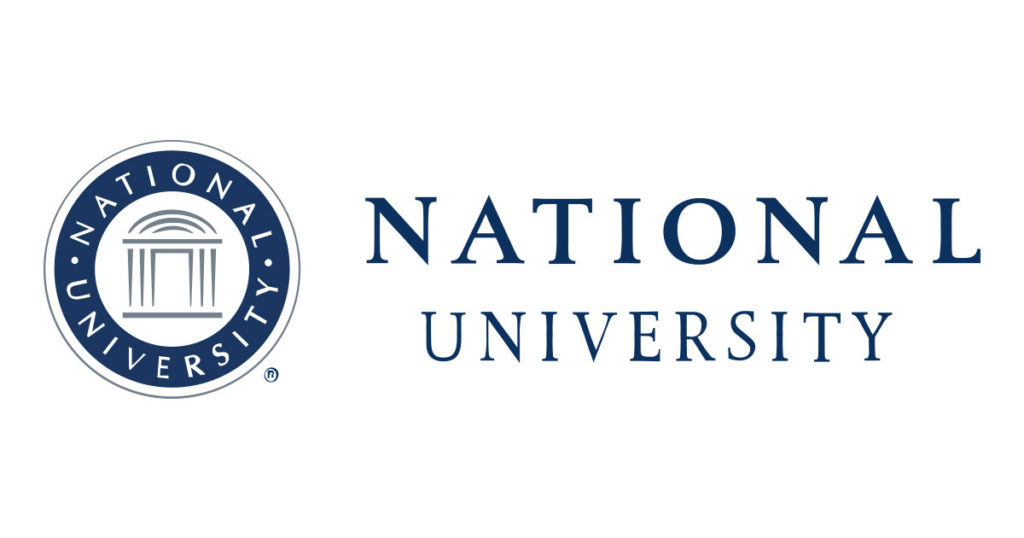Emergency management is a field in which experienced and qualified professionals will always be in high demand. A degree from one of the best emergency management programs could help you rise through the ranks quickly.

This list of the best 30 accredited online emergency management colleges is ideal for working professionals who want to take the next step in their career or for students graduating from high school and entering college.
Online degree programs are more convenient for those who prefer to study remotely and are typically cheaper than their on-campus counterparts regarding tuition and fees.
What is a Degree in Emergency Management?
Emergency management degrees are commonly chosen by students who wish to pursue a career within an organization or public service that responds to emergencies and disasters. This can be split into one of four key areas, which include:
- Emergency preparedness
- Emergency response
- Recovery
- Mitigation
Emergencies can be classified as natural disasters, domestic terrorism, and man-made catastrophes. These are usually events that occur on a large scale, potentially involving high numbers of casualties, a great deal of damage to infrastructure, or both.
These large-scale disasters require the coordination of numerous agencies. Medical, fire, and law enforcement organizations often respond. Experienced professionals are needed to lead the behind-the-scenes operations that ensure smooth collaboration between all involved parties.
However, some graduates choose to be frontline workers. Popular options include an emergency first responder or firefighter. A degree in emergency management is helpful for any of these roles.
See Also: 30 Accredited Online Colleges in Healthcare Management
How Long is an Emergency Management Program?
Most emergency management degree programs last four years. In some cases, there may be an opportunity to pair the degree with an accelerated program that leads to a master’s degree; these programs are usually five years in length.
This estimated program length is based on the assumption that you study full-time. However, many accredited online colleges offer emergency management degrees on a flexible or part-time basis to suit working professionals.
Additionally, there are emergency management associates degree programs out there. A two-year program might be a good choice if you want to test the waters or if the position you seek doesn’t require a bachelor’s degree or more.
See also: 30 Accredited Online Colleges in Public Health
What Kind of Courses Will I Take in an Emergency Management Program?
Every emergency management program prepares you with the necessary knowledge to succeed in any role relating to this field, including the four key areas outlined above. You’ll also learn about topics including natural disaster planning, and you may study more unique courses, including homeland security law and modern terrorism.
Aside from subject-specific knowledge, you’ll learn to develop soft skills essential to any career. These skills are perhaps even more important in emergency management due to the fast-paced nature of the discipline. These skills include:
- Decision-making under pressure
- Leadership
- Critical thinking
- Problem-solving
All these skills are essential for professionals coordinating a large-scale disaster recovery operation.
It’s common for these degree programs also to include an element of fieldwork. In most cases, this is an internship with a disaster recovery or emergency response service or organization.
While this isn’t a mandatory part of every bachelor’s degree, seeking out a program that includes the chance to gain hands-on experience is recommended. Fieldwork is invaluable in preparing for the role and understanding what’s required of you unless you’re already working in such a capacity.
See also: The Best Online Schools for Military and Ex-Military Students
What are the Best Colleges with Emergency Management Degrees?
Accredited Online College uses the most recent data from the Department of Education’s National Center for Education Statistics to determine the rankings below.
Each program has an individual score. That score is compared to all other universities offering that degree to determine the final score you see by each ranking.
Accredited Online College considers several factors when ranking programs. These include affordability, student-to-faculty ratio, and the number of on-campus and online programs. For more information about our ranking process, see our methodology page.
Now let’s have a look at the best online emergency management degrees!
1. American Military University
American Military University is known as one of the best providers of higher education programs to members of the U.S. Military. The school is accredited by the Higher Learning Commission, so you know you get a quality education. With classes starting each month, you can fit your education around your active service responsibilities.
This online Bachelor of Arts program in emergency and disaster management has no application or credit transfer fees. Books and ebooks also come without charge. Nearly three-quarters of graduates have no student loan debt incurred by American Military University, so it’s an affordable option, too.
As a student in this program, you’ll take courses including:
- Crisis Management
- Emergency Preparedness
- Risk Assessment
- Counterterrorism
- Emergency and Disaster Management Phases
Online undergraduate tuition at the American Military University is $285 per credit hour. But, since this is a military-affiliated university, active-duty military students receive a discount. If you fall into this category, your tuition will be $250 per credit hour.
AMU has a generous transfer policy as well. You can transfer as many as 90 of the 120 credits required to graduate. For these reasons, American Military University is in the top spot of our ranking of the best online emergency management degree programs.
2. University of Florida
The University of Florida Online enjoys high rankings for its online programs. In fact, U.S. News & World Report ranks the University of Florida Online as number one in the nation for online undergraduate programs. UF has five number-one rankings for its online course offerings.
As a UF student, you can access dozens of majors and earn the same UF degree as students graduating from a traditional, on-campus program. Among the programs available is an undergraduate degree in Fire and Emergency Services.
This program was developed for emergency service professionals who want to advance their careers in the areas of management and leadership. In addition to general education requirements, this program has a unique focus on fire science, emergency management, and EMS courses. Graduates commonly progress into roles within local, state, and national government agencies.
In addition to getting high marks for its online programs, UF Online is an affordable school. In-state tuition is $129.18 per credit hour, which includes fees. Out-of-state tuition is $300 per credit. You may qualify for financial aid, and active duty military and veterans may qualify for further assistance programs. With these avenues, you can get your degree for even less money!
3. National University
The largest private nonprofit university in San Diego, National University was founded in 1971. Today, it offers dozens of programs online. These programs, including the Bachelor of Science in Homeland Security and Emergency Management discussed below, include four-week intensive courses, but allow you to finish courses faster without sacrificing the quality of your education.
With this degree, you’ll be ready for management and leadership positions within the fields of business continuity, security, and disaster preparedness and management. The curriculum involves research in the private sector, government agencies, and more, and you’ll analyze and suggest improvements for these areas in the context of emergency management.
Undergraduate tuition is $442 per credit, though there might be variation in the tuition rate depending on the program you pursue. Your course levels also determine the rate you pay for each credit hour. The university’s website has a full breakdown of these rates.
National University is accredited by the Western Association of Schools and Colleges (WASC) Senior College and University Commission. What’s more, the school was founded by veterans and is committed to offering unique benefits to military personnel.
4. Arkansas State University
Arkansas State University welcomes nearly 15,000 students to campus and online each year. Yet, with a student-to-faculty ratio of 17:1, you won’t feel overwhelmed by large classes.
Founded in 1909, the university launched its online education programs in 2008, with dozens of programs available to choose from today. Curricula can be customized to suit your schedule and aspirations, making Arkansas State a good option if you need flexibility for your studies.
The Bachelor of Science in Disaster Preparedness and Emergency Management at Arkansas State combines the study of disaster readiness, mitigation, and planning. You’ll take classes like:
- Introduction to Incident Management
- Respiratory Protection
- Disaster and Mental Health
- Risk Identification and Prevention
- Principles of Healthcare Emergency Management
You get to select an area of emphasis, too. For example, you might specialize in administration, law enforcement, or health care.
This program is reviewed annually and updated for accuracy and quality. This means you’ll learn in the most up-to-date curriculum each academic year.
U.S. residents pay $229 per credit hour, while international students pay $252 per credit hour. There is also a $40 online fee that’s assessed on a per-credit basis.
5. Western Carolina University
Founded in 1893, Western Carolina University offers hundreds of undergraduate degrees, minors, and concentrations. The institution ranks within the top five nationally for undergraduate research. The Carnegie Foundation for the Advancement of Teaching has also recognized the school.
WCU attracts around 11,000 students each year. As a mid-size school, you get the best of both worlds – small class sizes and ample opportunities to take different courses and participate in social activities.
WCU’s Bachelor of Science in Emergency and Disaster Management program is taught by a faculty that includes nationally-recognized research professionals. You’ll study core areas of emergency and disaster management, including:
- Risk Assessment
- Vulnerability Analysis
- Emergency Planning
- Humanitarian Response and Disaster Relief
- Missing Persons and Search and Rescue
At the end of the program, you’ll complete credits in experiential courses, allowing you to study ethics, grant writing, or participate in an internship, to name a few options.
Online tuition at Western Carolina University is charged at two separate rates depending on your residency. In-state, full-time students will pay around $3,618.08. Students located out of state will pay around $5,618.08 for full-time studies. Part-time tuition rates are $185.26 for in-state students and $351.92 for non-resident students.
6. West Texas A&M University
West Texas A&M is more than 100 years old. The institution is situated on a 176-acre campus and offers you a choice of dozens of student clubs and organizations in which to take part. Of course, there are also dozens of programs of study to choose from as well.
The Bachelor of Applied Arts and Sciences in Emergency Management Administration is a four-year online program that gives you the flexibility to study what you want. You can conduct research, take specialized classes, and focus your training in areas that most benefit your occupational goals.
For example, you can take classes like:
- Administrative Law
- Principles of Emergency Management
- Municipal Government
- Public Financial Administration
- Ethics and the Justice and EMA Systems
Admission requirements are low, with incoming students only needing an overall GPA of 2.0. You may also benefit from priority consideration if you work actively within emergency management or emergency service roles.
West Texas A&M provides undergraduate students with affordable tuition rates. Undergraduate tuition is between $50 for in-state residents and $80 for out-of-state students. However, multiple fees are added to this cost.
7. Bellevue University
Bellevue University is a private, nonprofit institution that offers online and on-campus programs. Dozens of career-oriented programs are available, allowing you to tailor your education to your specific needs and wants.
Additionally, you’ll benefit from a generous transfer policy that could see you complete your program much faster. Bellevue is accredited by the Higher Learning Commission and has been named a military-friendly university.
Bellevue’s online Bachelor of Science in Emergency Management program focuses on the critical process of emergency and disaster management. You’ll explore topics related to mitigation and preparedness to response and recovery activities. Some of the courses you’ll take include:
- The National Incident Management System
- Emergency Planning
- Foundations for Professional Success
- Legal Issues in Emergency Management
- Natural Disasters
This program requires 120 credits to graduate. The entire degree can be completed online, with a final capstone project seeing you plan, develop, and implement a situational scenario.
Tuition for this undergraduate program is $440 per credit hour. However, active-duty U.S. Military, Reserve, Coast Guard, and National Guard members are eligible for a reduced tuition rate of $250 per credit hour for all undergraduate courses.
8. University of Arizona Global Campus
At the University of Arizona Global Campus, you can choose from dozens of degree programs at the undergraduate and graduate levels. Most programs are five- or six-week terms instead of semesters, so you can quickly work through your classes without being overwhelmed.
The university makes applying simple – there is no application fee or standardized testing requirement. Yet, you can rest assured you get a quality education because UAGC is accredited by the WASC Senior College and University Commission.
The program of most interest to you might be the Bachelor of Arts in Homeland Security and Emergency Management. Coursework focuses on recent and relevant topics to the discipline, drawing on real-world examples in its curriculum. This includes courses in criminal law, cybercrime, and the psychology of disaster, among others.
As noted earlier, courses are five to six weeks long, and you take one course at a time. You may transfer in a maximum of 90 credits from a previous program of study to help lighten the load of classes you need to complete for your degree.
Tuition for all online undergraduate courses at UAGC is $510 per credit. Additional fees apply, including a technology fee for each course taken. The school’s financial aid page has a full breakdown of fees and other program expenses.
9. Thomas Edison State University
Thomas Edison State University is one of the first schools in the nation to have a specific mission for adult education. The university offers academic studies in dozens of areas, including criminal justice, computer science, and nursing. Flexible learning options include fully online programs, credit transfer possibilities, credit-bearing examinations, and prior-learning assessments.
Thomas Edison State University offers an online Bachelor of Science in Homeland Security and Emergency Management that requires 120 credits to graduate. Your coursework focuses on areas such as homeland security, public safety, and emergency management. The curriculum has been designed for students who need to gain a solid foundation in the principles of these subjects and who want to gain greater managerial responsibilities in their careers. Specifically, you’ll take classes like:
- Management Information Systems
- Public Policy, Crime, and Criminal Justice
- White-Collar Crime
- Challenges in U.S. and Global Public Health
- War and American Society
This degree requires you to complete a capstone project as well. The capstone project is student-centered that serves as a summary learning experience. You’ll draw on the knowledge and skills you learned throughout the program and apply them to a research or applied project of your choosing.
Undergraduate tuition at TESU is $3,686 for New Jersey residents for nine or more credits per semester. Out-of-state students pay $4,778 per semester.
10. University of Central Missouri
The University of Central Missouri has an annual attendance of around 11,000 students. It’s accredited by the Higher Learning Commission and routinely ranks highly among regional universities in U.S. News & World Report‘s rankings. In fact, UCMO ranks 66th among regional universities in the Midwest and is 14th among top public schools. It’s also an affordable university with flat tuition rates for online studies.
This Bachelor of Science in Crisis and Disaster Management is taught by highly experienced faculty. The curriculum includes elements of hands-on training, ensuring you’ll graduate with the essential skills needed to succeed in this industry. Courses include:
- Introduction to Crisis and Disaster Management
- Community Risk Reduction
- Technology Application Studies
- Integrated Emergency Management
- Research Issues in Crisis and Disaster Management
Additionally, you must complete a practicum and a field exercise project, both of which are worth three semester credits. Specialization areas are also available. You can choose from Business Continuity, Emergency Management, and Emergency Services Management. Environmental Hazards and Public Health Disaster Management are additional specialization options.
Tuition for online programs at the University of Central Missouri is $268 per credit hour for undergraduate degree programs. Active-duty military servicemen and women, including those in Reserve and Guard, are eligible for a reduced rate of $250 per credit hour.
11. Embry- Riddle Aeronautical University
One feature that makes Embry-Riddle’s Bachelor of Science in Emergency Services stand out is that the Fire Emergency Services Higher Education organization has awarded it the Certificate of Recognition. This accolade indicates that a program’s curriculum covers all essential areas for a modern fire department to operate.
You can also pair this program with an Aviation Emergency Management Specialization or a Fire and Emergency Services specialization. What’s more, you may be able to gain additional recognized qualifications from the National Fire Academy through the completion of specified courses.
Online programs at Embry-Riddle are charged on a per-credit basis. Military-affiliated students may be eligible to receive a flat rate of $250 per credit hour. Civilians pay around $485 per credit hour. You can utilize the tuition calculator on the university’s website for specific costs, including fees.
12. University of Nebraska Omaha
Next on our list of the best emergency management colleges is the University of Nebraska Omaha. This school has a 15,000-strong student body, with around 80% of recent graduates reporting having one or more internship opportunities or jobs while attending UNO. Students here are known as Mavericks and participate in various clubs and organizations that enhance the learning experience.
UNO’s Emergency Management program requires a minimum GPA of 2.0 for consideration. It combines coursework in critical areas, including disaster preparedness, hazard mitigation, and response and recovery activities. As a graduate of this Bachelor of Science program, you will be prepared for employment in government and nonprofit settings, as well as private organizations.
The University of Nebraska-Omaha charges different rates for distance learning and on-campus programs. There are different rates for residents and non-residents, too. The undergraduate tuition for emergency management programs is $259 for residents and $411 for non-residents. Any student qualifying for the Metropolitan Advantage Program will receive a discounted rate of $389.
13. Excelsior University
Founded in 1971, Excelsior University was one of the first institutions in the nation to develop an online education program. Excelsior University operates a generous credit-transfer program, with students able to receive credit for past military and workforce training. Dozens of degree programs are available in many subject areas. This includes health sciences, liberal arts, and business.
Excelsior’s fully online bachelor’s degree program in national security focuses on the skills needed to manage first-response activities and coordinate collaboration between public safety agencies. You’ll gain the knowledge and skills required to understand the disaster management process concerning natural disasters, acts of terror, and more. To do so, you might take classes like:
- Comparative National Security Analysis
- National Security Ethics and Diversity
- Intelligence in National Security
- Cybersecurity
- International Economics
The courses you take may differ depending on which specialization you choose. Specializations include Topics in National Security or Intelligence and Security Analysis.
Excelsior University charges $510 per credit hour for undergraduate studies. Additional fees apply. You can find more information about tuition and fees on the university’s tuition page.
14. Northwestern State University of Louisiana
Established in 1884, Northwestern State University is situated on a historical site and is the oldest continuously occupied site of higher education in the state of Louisiana. Its online learning campus, eNSU Global Campus, was also the first electronic campus in the state.
NSU offers a Bachelor of Science in Unified Public Safety Administration. This degree includes concentrations in:
- Emergency Management Administration
- Fire and Emergency Medical Service Administration
- Law Enforcement Administration
- Public Facilities Administration
- Nuclear Surety
- Geo Computation
Choosing the relevant concentration for your career may increase your chances of obtaining a leadership or managerial role.
You must complete around 123-semester credits regardless of your chosen concentration. Doing so takes around four years of full-time study.
At just $192 per credit hour, NSU’s discounted tuition rates for military-affiliated students have earned the school a spot as a top military-friendly university. If you’re not a military student, tuition is $375 per credit hour up to 12 hours per semester and $100 per credit afterward.
15. University of Alaska Fairbanks
The College of Business and Security Management at the University of Alaska Fairbanks goes above and beyond to ensure you get many opportunities for hands-on learning experiences outside the classroom. You are encouraged to join at least one student organization, and the university funds attendance for conferences, career trips, and other events.
This Bachelor of Security and Emergency Management allows you to specialize in one of six areas, including some unique specializations not offered by other programs. These include:
- Cybersecurity and Information Technology Management
- Emergency Management
- Emergency Medical and Public Health Management
- Fire Administration
- Homeland Security
- Law Enforcement Management
Each specialization is carefully tailored for different career paths and can help you hone your job-related skills prior to graduation. Some skill-building courses you might take include Disaster Response Operations and Management, Training and Management Development, and Leadership in Dangerous Contexts.
UAF’s tuition rates vary depending on your residency. Alaska residents pay $289 per credit hour, while non-residents pay $855 per credit. Tuition for students in the Western Undergraduate Exchange is $434 per credit. If you’re a military-affiliated student, your tuition is $250 per credit.
16. Louisiana State University Alexandria
Founded in 1959, LSU-Alexandria focuses on business, criminal justice, and healthcare programs. Liberal arts, sciences, and psychology are other popular options. LSU Online, Louisiana State University’s e-learning campus, provides dozens of online degrees and certificate programs in these and other fields.
The advantage of learning online through LSU-Alexandria is that the same expert faculty teach courses as the school’s traditional programs. This gives you access to a top-notch education without having to meet for classes on campus.
LSU Online offers a fully online Bachelor of General Studies in Disaster Science and Emergency Management. The program requires 120 credit hours to graduate, which takes most students about four years to complete. You’ll take courses like:
- Technology and Emergency Management
- Introduction to Geographical Information Systems
- Introduction to Disaster Science and Emergency Management
- Disasters in History
- Public Health Emergency Preparedness
Tuition for this undergraduate program is $291 per credit hour. However, with Prior Learning Assessments, you may be able to earn credit toward your program. Both US Navy Training and Amazon Web Services certificates may help reduce the overall cost of your education.
17. State University of New York
Located in northern New York, SUNY Canton has a long, interesting history and is packed with opportunities for outdoor exploration. In fact, Canton has ranked within the top ten towns to raise a family in New York. Plus, the college campus is just a stone’s throw away from downtown Canton.
SUNY Canton’s Bachelor of Science in Emergency Management prides itself on being unique. Most classes are seven-week sessions, with numerous opportunities to participate in practical, skill-building activities with local, state, and federal agencies. There are also opportunities to intern in the same agencies, which can help improve your employability.
The diverse 123-credit curriculum includes coursework in the following areas:
- Emergency Planning
- Hazard Assessment and Mitigation
- Emergency Management and Response
- Legal Issues in Emergency Management
- Sociology of Disaster
SUNY Canton charges a flat online tuition rate of $3,535 per semester. This rate applies whether you’re a New York resident or resident of another state.
18. Anderson University
Anderson University is a Christ-centered institution that provides fully online programs to fit around your busy work schedule. Faculty members are experts in their field, all while modeling the principles of Christianity. Upon application, you will also be assigned an Academic Success Advisor, who will help guide your education from application through graduation.
While this program produces graduates with the necessary skills and experience to enter roles in homeland security and emergency services, it also provides the necessary foundation for continued graduate education. The program requires 122 credit hours to graduate. There are numerous starting dates throughout the year for added flexibility.
In addition to general education requirements, you must take 39 credits of major area courses. These include:
- Emergency Management Planning and Technical Writing
- Government Budgeting and Finance
- Strategic Planning: Homeland Security & Emergency Preparedness
- Incident Management & Planning for Emergencies
- Integrated Response to Disaster
The vast majority of online programs at AU are charged at a flat rate of $390 per credit hour. You may be eligible for some financial aid in the form of scholarships, grants, or loans, including those offered directly from the school, to offset the cost of your education.
19. University of Wisconsin-Oshkosh
The University of Wisconsin-Oshkosh has many accolades. But its focus on sustainability has been especially rewarded in recent years. As a student, you’ll have opportunities to champion sustainability and minimize negative impacts on the environment.
The University of Wisconsin-Oshkosh also focuses on giving you the assistance you need to complete your education. You’ll get individualized support and can take advantage of small class sizes. You’ll get academic advising throughout your studies, too.
UW Oshkosh’s Fire and Emergency Response Management degree program is accredited by the Degree Assembly Board of Governors, which belongs to the International Fire Service Accreditation Congress. The program lasts about four years. However, you’ll only need two years of full-time studies to complete the program if you already have an associate’s degree.
Some of the courses required to graduate include:
- Community Risk Reduction for Fire and Emergency Services
- Technology in Emergency Management
- Administrative Law
- Public Personnel Administration
- Fire Prevention Organization and Management
Tuition is $220 per credit for lower-division coursework and $295 per credit for upper-division courses. Financial aid is available for qualifying students. Note that courses outside the degree’s core requirements may include additional fees.
20. Jacksonville State University
Founded in 1883, Jacksonville State University has a total enrollment of almost 10,000 students, most of whom are full-time undergraduates. Almost 100 academic programs and concentrations are available, with many of these offered online.
Jacksonville State’s Bachelor of Science in Emergency Management includes 120 credit hours, with 30 mandatory hours in the major. This includes courses like:
- Introduction to Disaster Management
- Disaster Mitigation and Preparedness
- Disaster Response and Recovery
- Populations at Risk
- Research in Disasters and Emergency Management
You can combine this program with a minor in Homeland Security or a range of other minors, including Public Safety Telecommunications.
You can combine this program with a minor in Homeland Security or a range of other minors, including Public Safety Telecommunications.
Online undergraduate tuition at Jacksonville State University is $333 per credit hour. This doesn’t necessarily include all fees, which you can read more about on the university’s website. Graduate programs are only marginally more expensive at $410 per credit hour.
21. Colorado State University
Colorado State University has earned several impressive rankings from U.S. News & World Report in the past. These include ranking 72nd in the nation among top public schools and a top-100 ranking among the best colleges for veterans.
As one of the best emergency management schools, CSU has much to offer you as a prospective student preparing for a future fire and emergency services career. You can enroll in CSU’s undergraduate program in emergency services at three points during the year for greater flexibility. With small class sizes, you’re assured of receiving individual attention from your professors, too.
Some of the required courses for this degree include:
- Fire and Emergency: Legal Considerations
- Trends in Fire Science Technologies
- Fire Service Leadership
- Fire and Emergency: Human Resources
- Integrated Management Simulation
These courses are taught by experienced practitioners and cover a range of essential skills in disaster management. Each course is tailored to the responsibilities undertaken by fire departments on a day-to-day basis.
Some of CSU’s promises include tuition guarantees and military tuition assistance. Online undergraduate programs are $476 per credit.
22. Kansas Wesleyan University
Kansas Wesleyan University places a great deal of emphasis on students and the communities that they serve. Situated in the bustling city of Salina, which has a population of almost 50,000, KWU works closely with businesses on a local and regional scale. As a result, you get many opportunities to learn outside the classroom.
This Bachelor of Arts in Emergency Management is the only program of its kind within the state of Kansas, according to the program website. Available fully online, on-campus, or as a hybrid model combining both, the program takes about four years to complete. You’ll explore many topics, including:
- Multiculturalism in Public Safety
- Social Vulnerability Approach to Disasters
- Risk Analysis
- Hazard Mitigation and Preparedness
- Crisis Communication
You’ll also have the opportunity to train at Crisis City, a world-class training environment led by the Kansas Division of Emergency Management. There, you can learn more about Kansas’ ability to fight threats and respond to emergencies.
Tuition is a flat $215 per credit hour. Tuition is a flat $215 per credit hour. A full list of tuition rates and a net price calculator can be found on KWU’s tuition information page.
23. Northern Arizona University
Northern Arizona University has welcomed students for well over a century. Over the years, the university has grown by leaps and bounds. Today, the school offers hundreds of degrees and programs, including more than 150 that are entirely online.
One such program is the online Bachelor of Applied Science in Emergency Management. In addition to studying the key areas of emergency management, you will develop essential skills for the industry. These include:
- Problem-solving
- Critical thinking
- Leadership
- Budgeting
There’s also a heavy emphasis on hands-on experience. The curriculum links learning points to real-world problems, scenarios, and case studies to help you understand how your knowledge and skills apply in real-world settings.
This online undergraduate program costs $11,160 for tuition per year. Fees are an additional $418 per year. Department of Defense employees get a discount of $6,418 per year, which includes fees.
24. Grand Canyon University
Grand Canyon University’s online programs are structured and scheduled in such a way as to allow working professionals like you the time to get a higher education. GCU is an accredited university providing online learners access to state-of-the-art tools, including message boards, eBooks, and other software.
Offered via the Colangelo College of Business, Grand Canyon University provides a Bachelor of Science in Homeland Security and Emergency Management. The program is 120 credits with eight-week accelerated courses. You’ll study topics like:
- Communication in high-risk contexts
- Managing budgets and resources
- Training community members
- Studying local, state, and federal emergency preparedness guidelines
- Performing hazard analyses
Typical undergraduate tuition costs are $455 per credit hour. These rates are for online and evening classes, allowing you to fit your distance learning around your schedule. If you’re a military-affiliated student (including spouses), tuition is $250 per credit hour.
25. Bethel University
Bethel University is a private four-year university that integrates Christianity into its teachings. The school was established in 1842 in McKenzie, Tennessee, and is one of the state’s longest-standing institutions of higher education.
In addition to having a long-standing tradition of academic excellence, Bethel University is accredited by the Southern Association of Colleges and Schools Commission on Colleges. As a regionally-accredited university, the credits you earn at BU will transfer to most other accredited institutions and vice-versa.
BU’s Emergency Services Management degree program features courses in subject areas such as:
- Risk Analysis and Threat Assessment
- Management of Human Resources in Public Service Organizations
- Planning for Emergency and Disaster Management
- Survey of Emergency Management
- Financial Management of Emergency Response Organizations
You’ll also explore areas vital in supporting disaster relief organizations, such as organizational development and leadership.
The curriculum includes 128 semester hours, which takes eight semesters of full-time studies to complete. Bethel University Online charges tuition on a per-credit basis of $477. You can use the university’s net price calculator to get a more accurate estimate of the costs associated with this degree.
26. Ohio Christian University
Ohio Christian University is a Purple Heart University, in addition to being military-friendly. Class sizes here are small, with an 11:1 student-to-faculty ratio. Another benefit of attending this school is that many students receive financial aid to offset the cost of getting a degree. If that weren’t enough, the faculty is also committed to helping you develop both academically and spiritually.
Among online degrees in emergency management, this BA in Emergency and Disaster Management offers excellent flexibility. It’s available entirely online and as a traditional on-campus program. The curriculum integrates an abundance of fieldwork that helps you gain meaningful experience in emergency management. And with five-week-long learn-as-you-go courses, you can learn at your own pace.
You will also develop soft skills, including critical thinking, problem-solving, and decision-making. Early exposure like this is invaluable in fast-paced industries such as emergency management.
An undergraduate program at Ohio Christian University costs around $416 per credit hour. Military personnel get a discounted rate of $250 per credit hour.
27. Crown College
Founded in 1916 with origins as a small Bible college, Crown College is roughly 40 minutes outside of the Twin Cities in Saint Paul, Minnesota. The school offers a Christ-focused environment for obtaining your degree, whether you’re on campus or studying online.
Crown’s accredited disaster and emergency management program culminates with a Bachelor of Science degree. The program focuses on public policy, management principles, and best practices for disaster and emergency management. You also have the option of adding a dual degree or minor in:
- Criminal Justice
- Psychology/Counseling
- Ministry
- Business
Tuition rates at Crown College are lower than similar institutions. In fact, around 98 percent of enrolled students qualify for and receive financial assistance in the form of grants, loans, scholarships, or other aid.
Tuition at Crown College Online is $425 per credit for undergraduate studies and $575 per credit for most graduate degree programs. Tuition rates may be subject to change depending on the number of credits taken, too.
28. Pennsylvania College of Technology
With an average class size of 16, the Pennsylvania College of Technology offers you an intimate environment to pursue your degree. Thanks to these small class sizes and highly dedicated faculty, Penn College has been ranked for numerous achievements by U.S. News & World Report, including as second among colleges for veterans, fourth among top public schools, and sixth among regional colleges in the north.
Penn College’s online Bachelor of Science emergency management degree offers a broad range of specialized courses. You will explore topics in history, criminal justice, and disaster recovery. Other courses include international relations, public administration, and bioterrorism.
Also included are internship and capstone courses. In total, the program includes 300 hours of field experience, giving you valuable hands-on experiences that will help you transition to a full-time role or bolster your existing career knowledge.
At Penn College, all online undergraduate students pay in-state tuition rates regardless of residency. Currently, that rate is $515 per credit.
29. Drury University
Drury University is a relatively small, private university in Springfield, Missouri. The tenets of getting an education at Drury include individual study, innovation, flexibility, and creative problem-solving.
Drury’s reputation for rigorous academics has garnered several rankings by U.S. News & World Report. These accolades include top 15 rankings for Best Value, Best Undergraduate Teaching in the Midwest, and the Best College for Veterans.
Drury University’s Bachelor of Science in emergency management degree offers multiple start dates throughout the year. The program requires 124 credit hours to graduate. Your studies cover areas such as disaster preparedness, terrorism in the modern world, and homeland security. You will also learn essential decision-making and leadership skills, preparing you to advance into positions with greater levels of responsibility.
Drury Global Online charges $320 per credit hour for its online undergraduate programs. You can apply for financial aid options to offset the costs, including scholarships and grants. More information on tuition rates and fees, and the types of aid you may receive, can be found on the university’s financial aid page.
30. Arizona State University
Our list of online bachelors degree in emergency management programs concludes with Arizona State University. ASU offers more than 300 programs, including undergraduate degrees, graduate programs, and certificates. Many of these programs are nationally ranked within the top 25 in the U.S. Nearly 40 of ASU’s online programs rank in the top 10 in the nation.
ASU’s Bachelor of Science in Public Service & Public Policy requires 120 credits to graduate. The curriculum includes a concentration in Emergency Management and Homeland Security. It can also be paired with an accelerated option, which leads to a master’s degree in the same discipline. It takes about a year to complete the requirements for the master’s degree.
Some of the courses you’ll take include:
- Economics and Public Policy
- Public Service Research Methods
- Contemporary Policy Challenges
- Public Service Ethics
- Leadership and Change
You’ll take 40 classes in all, each of which meet for around 7.5 weeks.
You’ll take 40 classes in all, each of which meets for around 7.5 weeks.
Tuition ranges from around $561 to $661 per credit for undergraduate studies. This includes program fees. A more accurate estimate of your cost of attendance can be obtained from the tuition calculator.
Frequently Asked Questions
What Can I Do With a Degree in Emergency Management?
There are a number of roles open to emergency management professionals. If you’re working on the front line of an emergency response team, you could be an EMT or paramedic, firefighter, or hazardous materials removal worker. However, these workers are supported by professionals who work in offices or other organizations, coordinating and directing the efforts of first responders.
Behind-the-scenes roles might involve the emergency management director, who ensures that different agencies work effectively together, understand what they need to do, and are dispatched where they will be most effective and most needed. They might also take part in emergency planning, prepare response plans, or implement strategies that mitigate the chance of a disaster occurring.
Other roles not based in the field might include an information security analyst. An information security analyst performs digital disaster response activities, including installing security software to protect critical systems from cyberattacks. Security analysts also help restore systems to normal after an attack.
With the above in mind, these degree programs are popular among people already in these roles. Professionals in emergency management or response may choose to study an undergraduate degree to improve their knowledge of areas that are key to gaining more senior, managerial, and leadership positions.
Of course, if you’re a new college student working towards your bachelor’s degree, having a degree in this field can open many doors for employment, especially entry-level and mid-level positions. Jobs in this field are available in many settings, including the Department of Homeland Security (DHS), the Federal Emergency Management Agency (FEMA), and fire and emergency services, to name a few. There are career opportunities in public administration, risk management, and emergency services administration.
What is the Earning Potential With an Emergency Management Degree?
As with any career, those earning the highest salaries tend to work in managerial and leadership roles. Lower wages usually go to workers in entry-level or frontline roles. This field is no different.
Emergency management directors earn a median annual salary of $76,730, according to the Bureau of Labor Statistics (BLS). The pay range extends well beyond that mark, though. The pay range extends from a low of around $46,500 to a high of more than $133,580 per year.
Currently, the projected job growth is slower than average at just three percent per year over the next decade. With slower job growth, you’ll likely find greater job competition after graduation.
Meanwhile, frontline workers like EMTs and paramedics make a median annual salary of $36,930. Firefighters earn around $50,700, while police and detective roles attract a median salary of roughly $66,020. These are just a few of the roles open to you, though they are also some of the most common for graduates of an emergency management degree program.
How Do I Choose a Bachelor’s Degree in Emergency Management?
Given the frequent requirement for students to participate in fieldwork, you might choose a program based within or close to a larger city. Doing so increases the ease with which you can find local internship opportunities.
Online students are sometimes expected to find their own placements, though this is becoming the exception and not the rule. Still, when choosing an online emergency management program, it’s worth considering what the field experience requirements are when making your final decision.
As a distance learner, you should also give thought to your availability for study. If you’re commonly working between the hours of 9 a.m. and 5 p.m., then you’ll likely want to find a program that primarily offers evening and weekend classes, allowing you to fit your education around your busy work schedule.
Of course, your specific area of interest will guide your selection of the best online emergency management degree program for your needs. Not all schools offer the same degrees or areas of concentration. This being the case, focus your search on schools that offer programs that align with your career goals.
Cost is a major factor when choosing an online emergency management program, too. As you saw in the rankings above, the tuition rates vary widely from one school to the next. In some cases, a school might be too expensive for you to consider. On the other hand, exploring the financial aid options at each school will help you identify ways to reduce the cost of your degree. Doing so might even make one of the more expensive programs much more affordable.
Though online studies aren’t tied to a specific location, you might still consider where the emergency management school is located. For example, if you live on the east coast and enroll in a program based on the west coast, there will be a four-hour time difference. This could make it challenging to meet for online class times and submit assignments in a timely fashion.
Lastly, think about what you want to do after you complete your initial degree. For example, if you wish to continue your education and get a master’s degree, it’s worth finding an online emergency management school offering undergraduate and graduate degrees. On the other hand, if your goal is to get your undergraduate degree and head directly into the workforce, you might base your selection in part on the specific courses that are offered and the skills you learn in the program.
If you want to pursue higher education, check out the 30 Best Nationally Accredited Online Colleges and the 30 Top Accredited Online Colleges With Low Tuition!






























